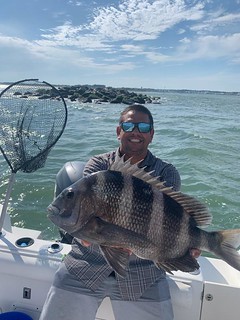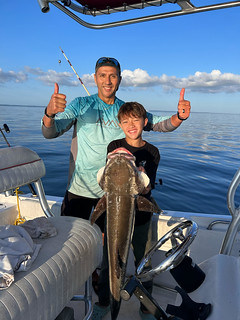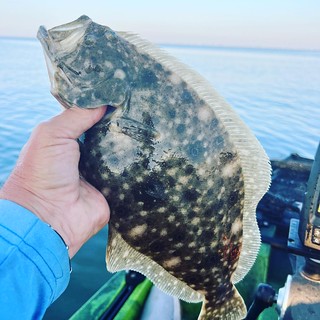Maryland Fishing Report – September 6
Although schools are now open and vacation season is mostly done, good summer fishing continues across Maryland. Take some time on the weekends and after-school hours to enjoy fishing together.
Forecast Summary: September 6 – September 12:
The upcoming week will be warm with scattered rain likely Friday through Monday. These conditions should result in Chesapeake Bay surface water temperatures holding stable in the low 80s. Cool water pulses will occur below Conowingo Dam during power generation – 78 degrees when generating, and 86 degrees when not generating. Bay salinity remains above average. Oxygen conditions are slightly better from below Bloody Point to the Virginia state line, with most places recording suitable fishing depths down to at least 35 feet. In the area from Tolchester to the Bay Bridge, avoid fishing below about 20 feet. Check our map of areas of low oxygen to help determine the maximum fishing depth in your favorite area.
Expect average flows in Maryland rivers and streams all week. There will be above average tidal currents Sunday through Tuesday as a result of the September 15 new moon. Expect average clarity in Maryland’s waters except on the main Bay from the mouth of the Patapsco to the Back River. To see the latest water clarity conditions, check Eyes on the Bay Satellite Maps.
As always, the best fishing areas could be further refined by intersecting them with underwater points, hard bottom, drop-offs, and large schools of baitfish.
For more detailed and up-to-date fishing conditions in your area of the Bay, be sure to check out Eyes on the Bay’s Click Before You Cast.

Jacob Busch caught this blue catfish in the lower Susquehanna River recently. Photo courtesy of Jacob Busch
The Conowingo Dam continues to follow the summer schedule of afternoon and evening power generation. Anglers who arrive at the dam pool are casting a mix of topwater lures, jerkbaits, and paddletails for striped bass. The dam pool also holds large populations of flathead and blue catfish that can be caught on fresh cut bait. Farther down the Susquehanna River, blue catfish tend to dominate the fishing scene.
Striped bass continue to hold near Pooles Island and the mouth of the Patapsco River. Spot are easy to obtain in the upper Bay, so using them for live-lining is the most popular way to fish striped bass. The bridge piers at the Key Bridge are also a good place for live-lining or jigging. Some anglers are fishing with live eels, which will become more popular when water temperatures drop and the spot move out of the region.
The channel edges at the mouth of the Patapsco provide a good place to jig for striped bass, and anglers are enjoying good action within the harbor by casting soft plastic jigs, topwater lures, and paddletails near commercial piers and old piling fields.
Anglers are finding striped bass holding near the Love Point rocks, where using spot for live-lining and jigging are effective, and also the mouths of the region’s tidal rivers at daybreak, where casting a mix of poppers and paddletails along the shorelines is popular.
Fishing for white perch is good this week in the lower sections of the region’s tidal rivers for anglers casting a mix of roadrunners, beetle-spins, and small spinnerbaits along shoreline structure areas. Fishing in deeper waters with bottom rigs baited with grass shrimp, pieces of bloodworm or artificial bloodworm baits has been good in the lower sections of the tidal rivers, and a few select knolls and reefs in the upper Bay.

Gavin Adams was fishing for white perch when he tangled with this large carp. Photo by Michael Adams
Fishing for striped bass in the middle Bay has been challenging, and hopefully the recent oppressive heat will be soon be done for the season. The mouth of the Choptank River, Eastern Bay, the Poplar Island Rocks and bay shorelines offer the best opportunities, before dawn with a mix of poppers, jerkbaits and paddletails. Once the sun clears the horizon, the fishing tends to shut down. Fishing at the bases of the Bay Bridge piers has been the same time schedule for those fishing with live spot and eels, cut baits, or soft crabs. Casting soft plastic jigs near the pier bases is another good option for anglers, but again is limited to the morning.
Fortunately for middle Bay anglers there are plenty of bluefish and a scattering of Spanish mackerel to be found. Trolling is the most popular way to fish for them with small Drone and Clark spoons pulled behind No. 1 planers. The channel edges from Buoy 83 south past the Sharps Island light, and the False Channel to the CP Buoy are among the better places to troll. When breaking fish can be spotted, casting small heavy metal jigs or Got-Cha lures into the swirl of fish is a good way to enjoy some light-tackle action.
Fishing for white perch is always a great summer activity and they are ready for small lures cast along shorelines during the early morning and late evening. Fishing in deeper waters near structure with bottom rigs baited with grass shrimp, bloodworms or small minnows is another good option. Blue catfish are holding in the middle to lower sections of the Choptank River and can be caught on cut bait. All the tidal rivers in the middle Bay hold channel catfish and blue catfish can show up at any time.
Anglers continue to work the shallower waters of the Bay and tidal rivers this week with topwater lures, jerkbaits, soft plastic jigs, and paddletails, searching for striped bass but often catching a mix of speckled trout, bluefish, and puppy drum. With the appropriately sized lure, the puppy drum can be slot-size.
A mix of Spanish mackerel and bluefish are providing plenty of fun fishing opportunities along the channel edges of the lower Potomac River near Smith Point, Point Lookout, Cedar Point, the eastern side of the shipping channel, and Tangier Sound. Small Drone and Clark spoons pulled behind No. 1 planers has been the most popular way to catch them. Those lucky enough to encounter breaking fish are catching bluefish and Spanish mackerel by casting small jigs into the fray.
Fishing for spot is at its zenith this week – they are large and heavy-shouldered and provide some excellent fun fishing and eating. The first major cool front in September may send them on their way, so load up family and friends and get in on the action. The mouth of the Patuxent River holds the largest population of spot, and pieces of bloodworm on a bottom rig are all that is needed to catch them. The Tangier Sound area also holds good populations of spot and a mix of white perch, sea trout, and small croaker.
Anglers that rig and fish for flounder are catching them in Tangier and Pocomoke sounds as well as the Point Lookout area. The hard shoal waters near the channels tend to be the best places to give drifting for flounder a try. Gulp baits on a jig head or fresh finger mullet, large minnows, and silversides are reported to be the best baits.
White perch continue to entertain anglers in the tidal creeks and rivers of the lower Bay. Many like to cast small spinnerbaits, roadrunners, and similar lures along shoreline structure during the morning and evening. Fishing small minnows under a bobber is a great way to target the larger perch, and bottom rigs baited with grass shrimp, pieces of bloodworm, or peeler crab work well in deeper waters.
Large sheepshead continue to be caught by anglers fishing at the Target Ship with peeler crab, clams, and fiddler crabs. Large red drum are being caught by anglers trolling large spoons near the Target Ship area and a few cobia are being caught by those chumming and drifting with live eels in their chum slick.
Recreational crabbing success is reported to have dropped off this week. Most are reporting a half-bushel of No. 1 crabs per outing in the middle and lower Bay, and slightly less in the upper Bay. The best crabs tend to come from waters deeper than 10 feet, and those working trotlines report the frustration of crabs dropping off before they can be netted.
Although the heavy hand of summer’s high temperatures is still going to be with us this week, September holds the promise of cooler weather, more rain, and eventually water temperatures dropping. The upper Potomac River and many of the creeks and streams that dot the landscape of western and central Maryland are experiencing low flow conditions.
The upper Potomac River offers anglers the opportunity in some locations to wade out from shore to cast for smallmouth bass during the morning and evening. Since water levels are down and the water is very clear, a stealthy approach, long casts, and light lines will improve fishing success. When fishing the catch-and-release or trophy trout management waters, the same tactics will also work well.
Now that Labor Day is behind us, anglers hopefully will see reduced boat traffic on Deep Creek Lake and improved fishing conditions for cold-water species. Floating docks will still be present for another month and provide good places to target largemouth and smallmouth bass during the day.
The Baltimore and Washington Suburban Sanitary Commission reservoirs in central Maryland are exceptional places to fish for largemouth and smallmouth bass and a mix of other freshwater species this week. The tidal rivers of the Chesapeake also hold populations of largemouth bass that provide excellent fishing opportunities.
Northern snakeheads are moving off their protective vigil over fry balls and are becoming more interested in feeding and building up body reserves. They are still holding in thick and shallow grass beds so topwater lures in the form of buzzbaits, chatterbaits, and soft plastic frogs are good choices for lures.

Jeff Weeks caught this large sheepshead recently in the Ocean City inlet. Photo courtesy of Jeff Weeks
Surf anglers have been dealing with high tides and flooding conditions along the beaches of Assateague recently, but conditions look favorable this week. Fishing for a mix of kingfish, spot, flounder, and bluefish should resume. Water temperatures are still warm so often the best fishing is during the early morning hours.
At the Ocean City Inlet and the Route 50 Bridge area, fishing for striped bass and bluefish has been good for those casting soft plastic jigs, Got-Cha lures, or drifting cut bait. Flounder are also being caught along with a few sea trout. Sheepshead are being found near the jetty rocks and bridge piers and are often of impressive size; sand fleas are a popular bait.
The back bay channels are providing good flounder fishing this week and boat traffic is down. The largest flounder are being caught by drifting with live spot or finger mullet and white or pink Gulp baits. High flood and high ebb tides tend to provide the best fishing opportunities.
Outside the inlet, fishing for sea bass, flounder, and small dolphin has been very good at the offshore wreck and reef sites. The boats heading out to the canyons and trolling are doing very well with white marlin catches and a few sailfish. Bigeye tuna and dolphin are helping round out the daily catches.
“Caution is a most valuable asset in fishing, especially if you are the fish.” – Anonymous
Maryland Fishing Report is written and compiled by Keith Lockwood, fisheries biologist with the Maryland Department of Natural Resources.
Click Before You Cast is written by Tidewater Ecosystem Assessment Director Tom Parham.
This report is now available on your Amazon Echo device — just ask Alexa to “open Maryland Fishing Report.”


